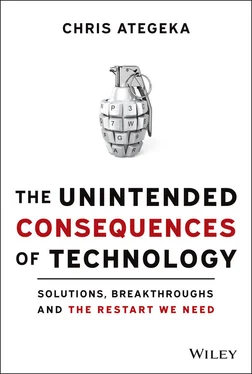For these companies, it starts with money, which gives them power, which buys them political leaders via donations and other forms of lobbying. This leads to control and influence over the government, which makes it very difficult to pass any meaningful regulation that would keep these companies in check.
Eight men have the same wealth as the 3.6 billion people who make up the poorest half of humanity, according to a new report published by Oxfam that marks the annual meeting of political and business leaders in Davos (Oxfam America, 2017). The report, “An economy for the 99 percent,” shows that the gap between rich and poor is far greater than had been feared. It details how big business and the super-rich are fueling the inequality crisis by dodging taxes, driving down wages, and using their power to influence politics to their advantage.
In places where tech-states have not been able to buy their way into the political system, they will sometimes threaten to leave the region when there are attempts to regulate them. Because of these companies' outsized ability to create jobs and provide services, they still wield a lot of power.
As an example, Elon Musk threatened to move Tesla headquarters out of California at the beginning of 2020 due to COVID-19 restrictions. In fact, Tesla ended up suing state authorities over lockdown after the Fremont factory was stopped from reopening (Reuters, 2020). Keep in mind that these regulations applied to everyone and every company, big and small. Tesla sued local authorities in California and pushed to reopen its factory. They threatened to move the company's headquarters to Texas or Nevada, where regulators are looser. Tesla did end up moving to Texas. At the end of 2020, SpaceX and Tesla CEO Elon Musk revealed that he had moved to Texas and was rapidly relocating his California-based business empire to the Lone Star State. With a new Tesla factory under construction and two increasingly busy SpaceX facilities in the state, it was not unexpected news (Cao, 2020)
Another example happened in 2019, when Amazon canceled its plans to build its second headquarters in New York after battling with activists and union leaders (Goodman, 2019).
It's becoming increasingly difficult for legislators to regulate any tech-state companies, because of their sheer oversized influence. It's not hyperbole to say that, as of this writing, a handful of tech-state companies are in control, and not the nation-state or government. Here are some examples to back up this statement:
In 2018, the European Parliament summoned Mark Zuckerberg as the CEO of Facebook to testify in a parliamentary hearing. He was a no-show. At the time of the hearing, the committee shared a now infamous picture of the empty seat and nameplate, stating: “Nine countries. 24 official representatives. 447 million people represented. One question: where is Mark Zuckerberg?” Not much they could do about it!
In 2021, tech-state companies acted unilaterally and censored the president of the United States and many of his influential followers. Hate him or love him and what he stands for, he was still the president of the most powerful country in the world. Think about that.
Of course, incitement to violence is a criminal offense in all liberal democracies around the world. There is an obvious reason for this: violence is harmful. It harms those who are immediately targeted. Five people died in the riots of January 6, 2021, in Washington DC. “A police officer was beaten, a rioter was shot, and three others died during the rampage” (Healy, 2021). Violence also harms the institutions of democracy themselves, which rely on elections rather than civil wars and on a peaceful transfer of power.
To be fair to the tech-state, there is no doubt the former president was given considerable leeway in his public commentary prior to—and during the course of—his presidency. However, he crossed a line into stoking imminent lawlessness and violence. Thus, many could argue that he brought it on himself. We all agree that we need to improve social media, but the tougher question is how we tackle misinformation while also valuing freedom of expression.
The point still remains. A single individual at certain companies can censor whomever they want! That's the outsized power I am talking about.
The Exponential Nature of Tech
Nation-states cannot regulate exponential digital technologies (tech-states) using the same processes and tactics used to regulate analog technologies. It simply won't work; the bullet train is moving too fast. Regulations are always going to be trailing, playing catch up. More often than not, they are reactively responding to problems and issues.
New exponential technology companies require new “tricks” for oversight.
The relationship between tech companies and regulations reminds me of a chameleon. The slow speed at which chameleons walk is metaphorically how governments and regulators are approaching regulating tech-state companies. These tech-state companies are like flies, flapping their wings 230 beats per second.
The chameleon has had to adapt its tongue to move as fast as the fly, without moving its entire body in order to keep up. Do yourself a favor and watch a video of a chameleon catching a fly in slow motion. It's impressive! If nation-state regulators are to ever catch up with the big, fast-moving wings of exponential tech, they have to adapt like the chameleon.
What is needed is a fundamental change so that nation-states can regain their power and protect the planet and all of humanity, not just a fortunate few.
A monopoly happens when a company and its product offerings dominate a sector or industry. The term “monopoly” is often used to describe an entity that has total or near-total control of a market. Monopolistic companies fend off competition at all costs in what is now known as the “buy or bury” approach. Many tech-state companies, although they would not admit it, are monopolies. If any meaningful competition bubbles to the surface, their first efforts are to try to buy them. If the founders are stubborn and say no, tech-state companies often build a copycat version of that product, squeeze the air out of the tiny startup, and bury it before it has a chance to respond.
Facebook, for example, has used its dominance and monopoly power to crush smaller rivals and snuff out competition in an effort to maintain its market dominance in the social networking industry. The U.S. federal government and 48 states made a move to file lawsuits against Facebook, accusing it of anti-competitive conduct by abusing its market power to create a monopoly and crushing smaller competitors (Business Standard, 2020). In the late 1990s, Microsoft also lost a lawsuit to the U.S. government when the judge ruled that Microsoft had actively tried to crush its competitors, including Apple, IBM, Netscape, Sun, and others (Blumenthal and Wu, 2018). Facebook is taking a page from the Microsoft playbook.
Facebook and many tech giants like it employ unique data-gathering tools to monitor hot new apps in an effort to see what is gaining traction with users. That data helps Facebook and others select acquisition targets that pose the greatest threats to their market dominance. Once selected, they offer the heads of these companies vast amounts of money, which greatly inflates the values of the apps, all in hopes of avoiding any competition in the future.
Facebook and Zuckerberg saw Instagram as a direct threat quickly after the company launched. After initially trying to build its own version of Instagram (which gained no traction), in 2012 Zuckerberg admitted that Facebook was “very behind” Instagram and a better strategy would be “to consider paying a lot of money” for the photo-sharing app in an effort to “neutralize a potential competitor.” A few months later, in April 2012, Facebook acquired Instagram for $1 billion, despite the fact that the company did not have a single cent of revenue and valued itself at $500 million (Stickings and Griffith, 2020).
Читать дальше












